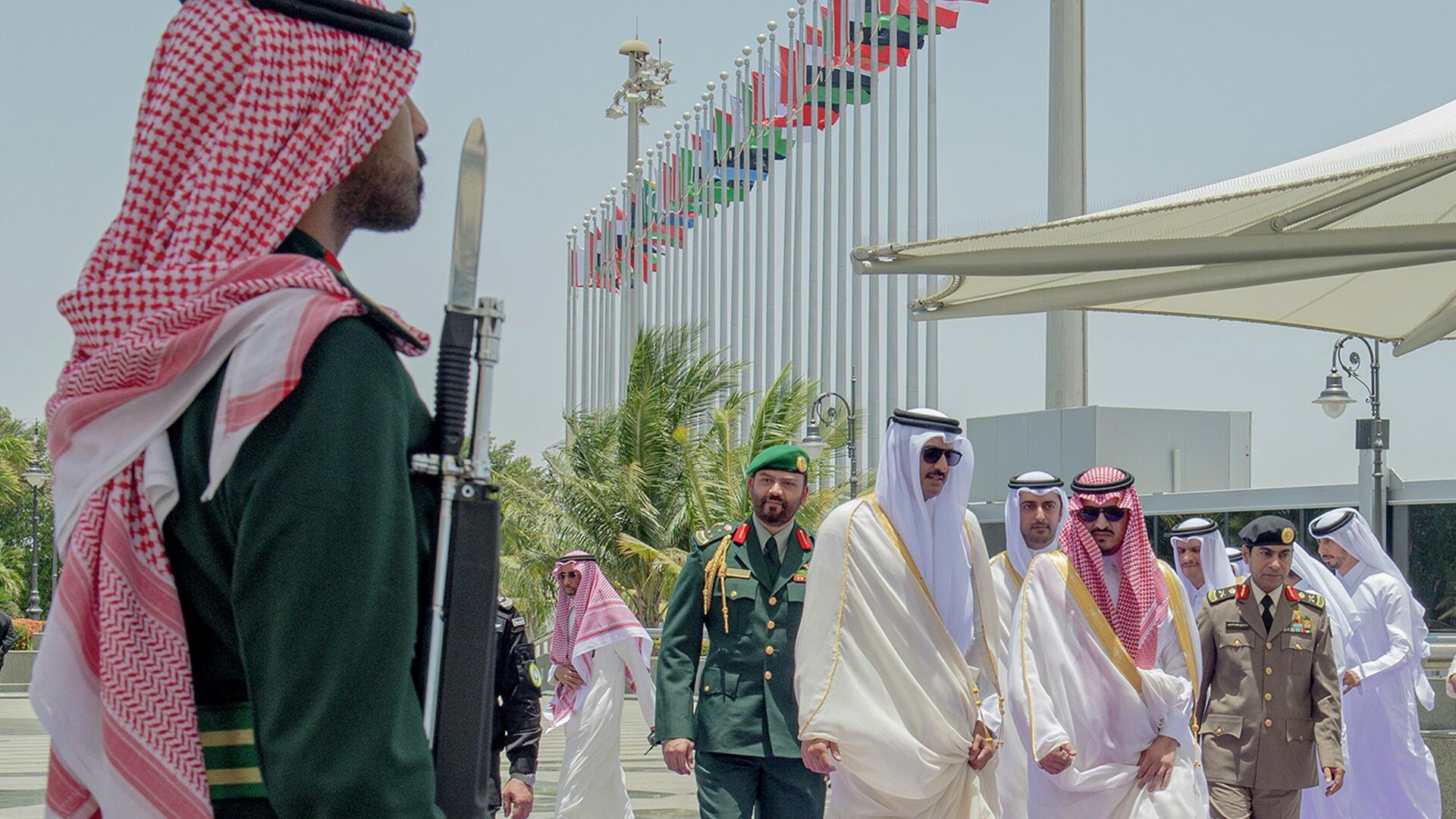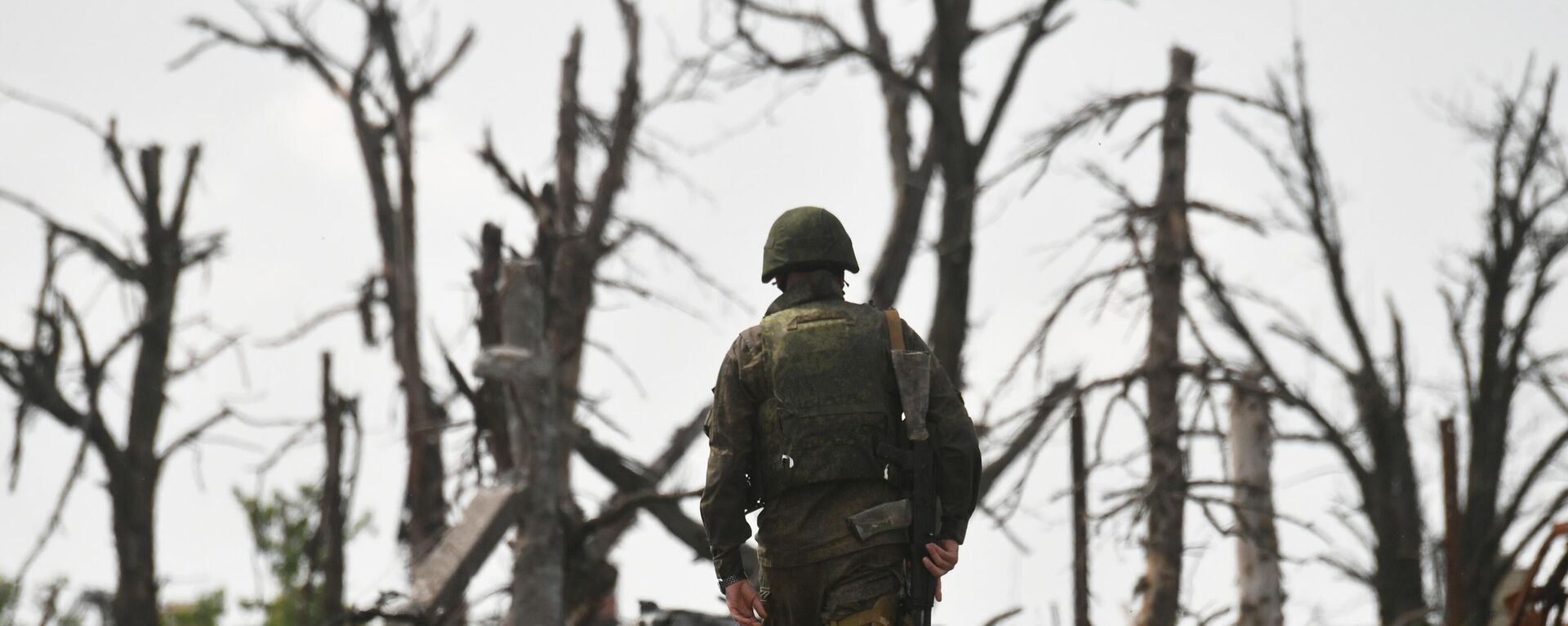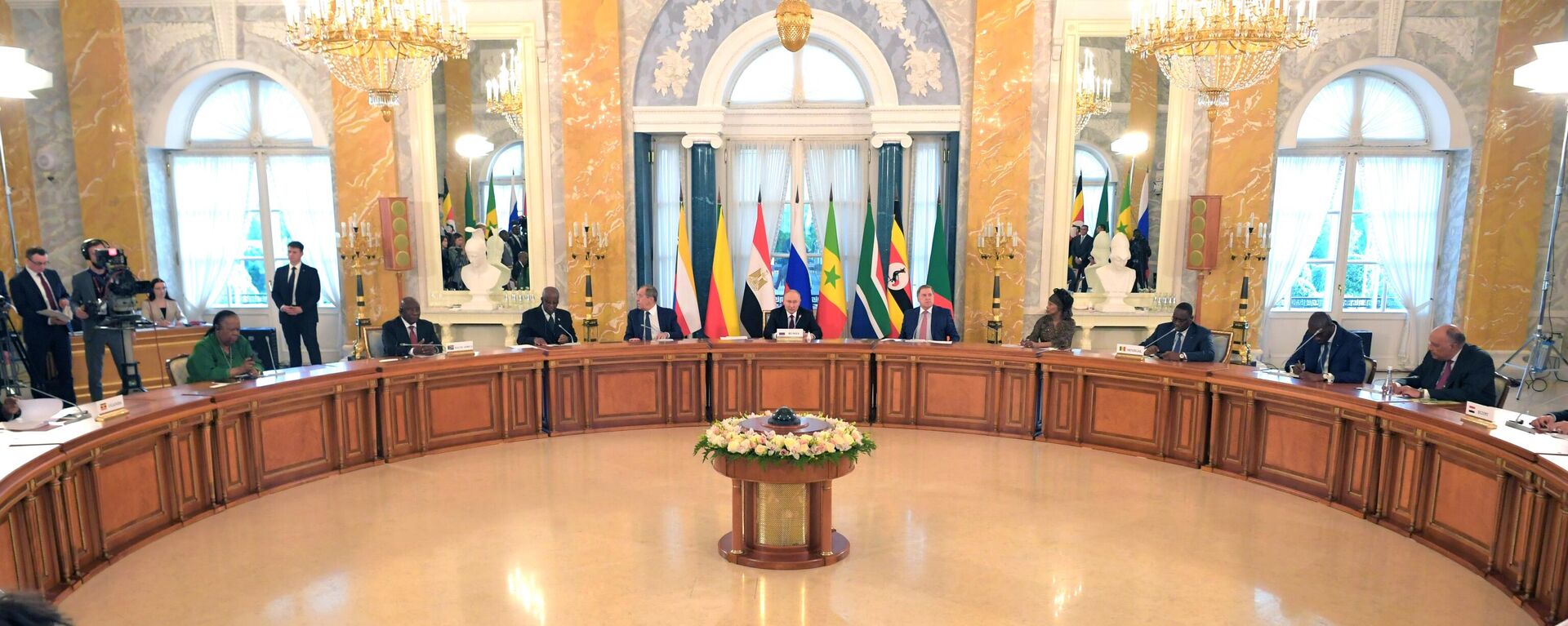https://en.sputniknews.africa/20230809/ex-south-african-envoy-slams-zelenskys-non-starter-plan-says-jeddah-talks-doomed-to-fail-1061185872.html
Ex-South African Envoy Slams Zelensky's 'Non-Starter' Plan, Says Jeddah Talks ‘Doomed to Fail’
Ex-South African Envoy Slams Zelensky's 'Non-Starter' Plan, Says Jeddah Talks ‘Doomed to Fail’
Sputnik Africa
On August 5-6, Saudi Arabia hosted "peace talks" on Ukraine in Jeddah, inviting emissaries from some 40 countries, but not Russia. The two-day gathering in... 09.08.2023, Sputnik Africa
2023-08-09T14:52+0200
2023-08-09T14:52+0200
2023-08-09T14:53+0200
ukraine
russia
peace
peace talks
jeddah
saudi arabia
ukraine crisis
african russia-ukraine peace initiative
opinion
https://cdn1.img.sputniknews.africa/img/07e7/08/09/1061190501_0:320:3072:2048_1920x0_80_0_0_07990655b75724d3fe986460874d3a02.jpg
Tensions increased over the weekend when Russia was not invited to participate in talks in the Saudi city of Jeddah, where senior officials from nearly 40 nations met to discuss "a peace plan" to solve the Ukraine crisis promoted by Ukrainian President Volodymyr Zelensky. The Russian Ministry of Foreign Affairs expressed its skepticism, labeling the meeting "doomed." To gain insight into the significance and potential consequences of these talks, Sputnik Africa talked to Dr. Kingsley Makhubela, a conflict resolution specialist, Director at RiskRecon, and former South African ambassador.Dr. Makhubela stressed the importance of involving all parties to the conflict in any related peace conference.A 'Nonstarter' PlanMakhubela argued that "that's where the big mistake the West and those invited to the meeting are making," adding that Western powers are aiming to "formulate the Ukrainian position" through the Jeddah meeting. The former diplomat cited media reports that the Ukrainian president claimed the meeting supported his stance.Zelensky's ten-point position, which Dr. Makhubela described as a "nonstarter" for negotiations, seeks the "capitulation of Russia" by demanding reparations and the return of territories like Crimea and Donbass. Therefore, the ex-ambassador doesn't "think that the meeting in Jeddah will make any impact."Furthermore, Dr. Makhubela highlighted China's initiative. Last year, Beijing presented a twelve-point plan for negotiations, which he viewed as more balanced. The Chinese proposal acknowledges both Russia's security concerns and the importance of global security.The conflict resolution specialist emphasized that resolving the conflict requires addressing the fundamentals of Russian security and revising the security architecture.Concerns regarding the militarization of neighboring countries, such as Germany's hike in defense expenditures of around €100 billion, contribute to Russia perceiving itself as an enemy in the eyes of the West, according to Makhubela.He stressed that these concerns indicate a fundamental mistake in the approach taken so far.Overall, Dr. Makhubela maintained a pessimistic view regarding the outcome of the Jeddah talks. Not including Russia and focusing on a position that seeks its capitulation is not a viable strategy, as it further doubles down on positions and undermines the possibility of achieving a peaceful resolution.Africa's ContributionWhile discussing Africa's potential contribution to the resolution of the Ukrainian conflict, Makhubela emphasized the importance of Africa adopting a balanced position as a mediator in the conflict. He criticized Africa's previous pronouncements, particularly during their trip to Kiev and St. Petersburg.According to the South African diplomat, who has huge experience in conflict resolution in countries such as Sudan and Somalia, taking positions on contentious issues such as the return of children and respect for territorial integrity could hinder effective mediation efforts. In his view, such issues need to be "resolved at the negotiation table" between the parties to the conflict.He added that during the recent talks in Jeddah, the people gathered were "speaking about the respect for territorial integrity, but they forget that Kosovo seceded from Serbia under the same arrangement that there the Donbass areas are having."Commenting on the recent meeting of the African Peace Initiative on Ukraine with Russian President Vladimir Putin following the Second Russia-Africa Summit in St. Petersburg on July 27-28, Dr. Makhubela acknowledged that some experts felt that African leaders were more receptive to the position put forward by Russia.He highlighted the West's narrative that portrays Moscow as unwilling to seek a peaceful and negotiated settlement in Ukraine. However, Dr. Makhubela emphasized that President Putin's willingness to resolve the conflict peacefully was evident from the summit and his statements.Dr. Makhubela viewed the outcome of the St. Petersburg meeting as a clear indication that Russia is not opposed to a peaceful resolution. However, he noted that the finer details of the settlement were not discussed during the event, as it primarily focused on conveying the message that "Russia is willing to resolve the problem."These conditions, according to the conflict resolution expert, create obstacles to successful negotiations and hinder the prospect of reaching a peaceful resolution.
https://en.sputniknews.africa/20230808/1061168758.html
https://en.sputniknews.africa/20230803/african-countries-peace-initiative-on-ukraine-brings-results-sa-official-says-1061046881.html
ukraine
russia
saudi arabia
Sputnik Africa
feedback@sputniknews.com
+74956456601
MIA „Rossiya Segodnya“
2023
Muhammad Nooh Osman
https://cdn1.img.sputniknews.africa/img/07e7/04/0a/1058467512_0:0:1280:1280_100x100_80_0_0_ec723833bcbfcaed2e21952965ad99e4.jpg
Muhammad Nooh Osman
https://cdn1.img.sputniknews.africa/img/07e7/04/0a/1058467512_0:0:1280:1280_100x100_80_0_0_ec723833bcbfcaed2e21952965ad99e4.jpg
News
en_EN
Sputnik Africa
feedback@sputniknews.com
+74956456601
MIA „Rossiya Segodnya“
Sputnik Africa
feedback@sputniknews.com
+74956456601
MIA „Rossiya Segodnya“
Muhammad Nooh Osman
https://cdn1.img.sputniknews.africa/img/07e7/04/0a/1058467512_0:0:1280:1280_100x100_80_0_0_ec723833bcbfcaed2e21952965ad99e4.jpg
ukraine, russia, peace, peace talks, jeddah , saudi arabia, ukraine crisis, african russia-ukraine peace initiative
ukraine, russia, peace, peace talks, jeddah , saudi arabia, ukraine crisis, african russia-ukraine peace initiative
Ex-South African Envoy Slams Zelensky's 'Non-Starter' Plan, Says Jeddah Talks ‘Doomed to Fail’
14:52 09.08.2023 (Updated: 14:53 09.08.2023) Muhammad Nooh Osman
Writer/Editor
Longread
On August 5-6, Saudi Arabia hosted "peace talks" on Ukraine in Jeddah, inviting emissaries from some 40 countries, but not Russia. The two-day gathering in Jeddah was a follow-up to a similar June meeting in Denmark, which failed to generate a joint statement.
Tensions increased over the weekend when Russia was not invited to participate in talks in the Saudi city of Jeddah, where senior officials from nearly 40 nations met to discuss "a peace plan" to solve the Ukraine crisis promoted by Ukrainian President Volodymyr Zelensky. The Russian Ministry of Foreign Affairs expressed its skepticism, labeling the meeting "doomed."
To gain insight into the significance and potential consequences of these talks, Sputnik Africa talked to Dr. Kingsley Makhubela, a conflict resolution specialist, Director at RiskRecon, and former South African ambassador.
Dr. Makhubela stressed the importance of
involving all parties to the conflict in any related peace conference.
"There's no peace conference [on Ukraine] that can take place without the participation of Russia," he stressed. "It's just a wrong thing to have a so-called peace agreement without all parties involved in the conflict. So it is doomed to fail."
Makhubela argued that
"that's where the big mistake the West and those invited to the meeting are making," adding that Western powers are aiming to "formulate the Ukrainian position" through the Jeddah meeting. The former diplomat cited media reports that the Ukrainian president claimed the meeting
supported his stance.
Zelensky's ten-point position, which Dr. Makhubela described as a "nonstarter" for negotiations, seeks the "capitulation of Russia" by demanding reparations and the return of territories like Crimea and Donbass. Therefore, the ex-ambassador doesn't "think that the meeting in Jeddah will make any impact."
"That meeting seems to gravitate, to enforce and take a position that Zelensky has come up with, the ten-point position, which is essentially not a position for peace, but for capitulation of Russia. They are seeking [the] capitulation of Russia, which is virtually impossible," Makhubela told Sputnik Africa.
Furthermore, Dr. Makhubela highlighted China's initiative. Last year, Beijing presented a twelve-point plan for negotiations, which he viewed as more balanced. The Chinese proposal acknowledges both Russia's security concerns and the importance of global security.
The conflict resolution specialist emphasized that resolving the conflict requires addressing the fundamentals of Russian security and revising the security architecture.
"The Chinese position on negotiations is very balanced because it speaks about the security concerns of Russia and global security," he said. "There's no way that the conflict will be resolved between Russia and Ukraine without addressing the fundamentals of Russian security. That must be addressed, and the security architecture must be looked totally different."
Concerns regarding the militarization of neighboring countries, such as Germany's hike in defense expenditures of around €100 billion, contribute to Russia perceiving itself as an enemy in the eyes of the West, according to Makhubela.
He stressed that these concerns indicate a fundamental mistake in the approach taken so far.
"How does it do to the security threat of Russia?" he asked. "Because Russia is still perceived as the enemy by the West, and that's why the fundamental mistake has been made."
Overall, Dr. Makhubela maintained a pessimistic view regarding the outcome of the Jeddah talks. Not including Russia and focusing on a position that seeks its capitulation is not a viable strategy, as it further doubles down on positions and undermines the possibility of achieving a peaceful resolution.
"Saudi Arabia wants to be a mediator. How do you become a mediator when you are sitting with a group that is conniving on how to isolate Russia and how to work out the capitulation of Russia? So that that's where the problem is," he noted.
While discussing Africa's potential contribution to the resolution of the Ukrainian conflict, Makhubela emphasized the importance of
Africa adopting a balanced position as a mediator in the conflict. He criticized Africa's previous pronouncements, particularly during their trip to Kiev and St. Petersburg.
"Africa's contribution to the resolution of the conflict is actually to have a balanced position," the expert said. "The position that has been adopted by Africa during that their [first] trip to Kiev and to St. Petersburg, in my own view, and I've said this quite openly, was a big mistake."
According to the South African diplomat, who has huge experience in conflict resolution in countries such as Sudan and Somalia, taking positions on contentious issues such as the return of children and respect for territorial integrity could hinder effective mediation efforts. In his view, such issues
need to be "resolved at the negotiation table" between the parties to the conflict.
"Africa should stop making pronouncements about what they believe. This is not about them, this is about Russia and Ukraine, and as a mediator, you cannot start to take position on issues under the conflict," Makhubela said. "I think Africa should stay out of making its own position known."
He added that during the recent talks in Jeddah, the people gathered were "speaking about the respect for territorial integrity, but they forget that Kosovo seceded from Serbia under the same arrangement that there the Donbass areas are having."
"Now, why is it applicable to one area and not applicable to the other area? Those are issues under dispute. They must be left to the parties, to the disputes, to try to resolve them," Makhubela argued.
Commenting on the recent meeting of the African Peace Initiative on Ukraine with Russian President Vladimir Putin following the Second Russia-Africa Summit in St. Petersburg on July 27-28, Dr. Makhubela acknowledged that some experts felt that African leaders were more receptive to the position
put forward by Russia.
He highlighted the West's narrative that portrays Moscow as unwilling to seek a peaceful and negotiated settlement in Ukraine. However, Dr. Makhubela emphasized that President Putin's willingness to resolve the conflict peacefully was evident from the summit and his statements.
"For Russia to start with the special operation, it was because the avenue for negotiation was shut down. The West persuaded Zelensky not to negotiate with Russia. And even Boris [Johnson, the former prime minister of the United Kingdom] flew from London to Kiev to persuade Zelensky not even to negotiate, when the discussions were starting," the ex-diplomat said.
Dr. Makhubela viewed the outcome of the St. Petersburg meeting as a clear indication that Russia is not opposed to a peaceful resolution. However, he noted that the finer details of the settlement were not discussed during the event, as it primarily focused on conveying the message that "Russia is willing to resolve the problem."
"And of course, what happened? People like [US Secretary of State Antony] Blinken came out to say, 'no, under these circumstances, they shouldn't be any negotiations. For negotiations to happen, Russia must withdraw and Russia must be subjected to the ten point that Zelensky is painting'," Makhubela told Sputnik Africa.
These conditions, according to the conflict resolution expert, create obstacles to successful negotiations and hinder the prospect of reaching a peaceful resolution.




